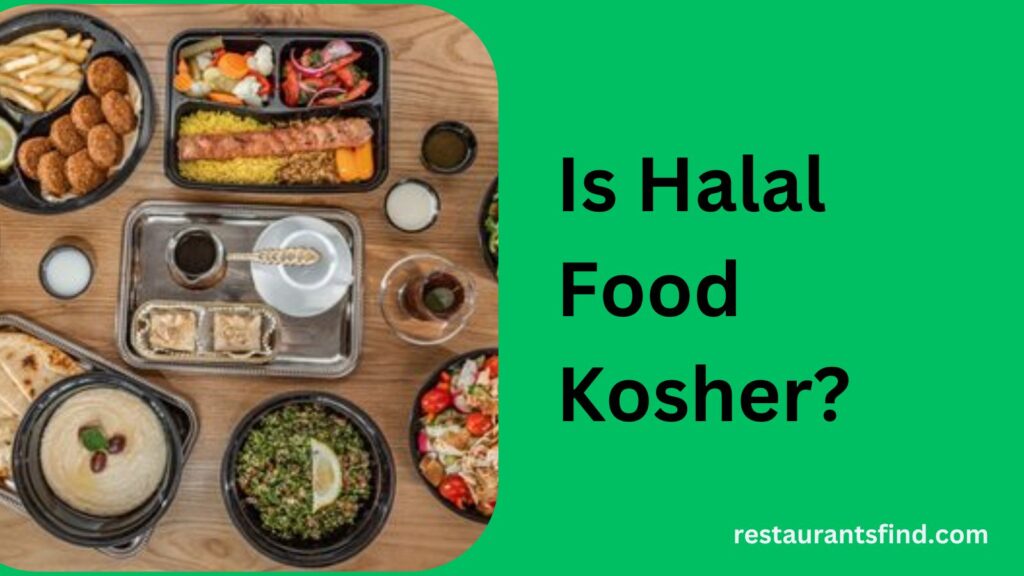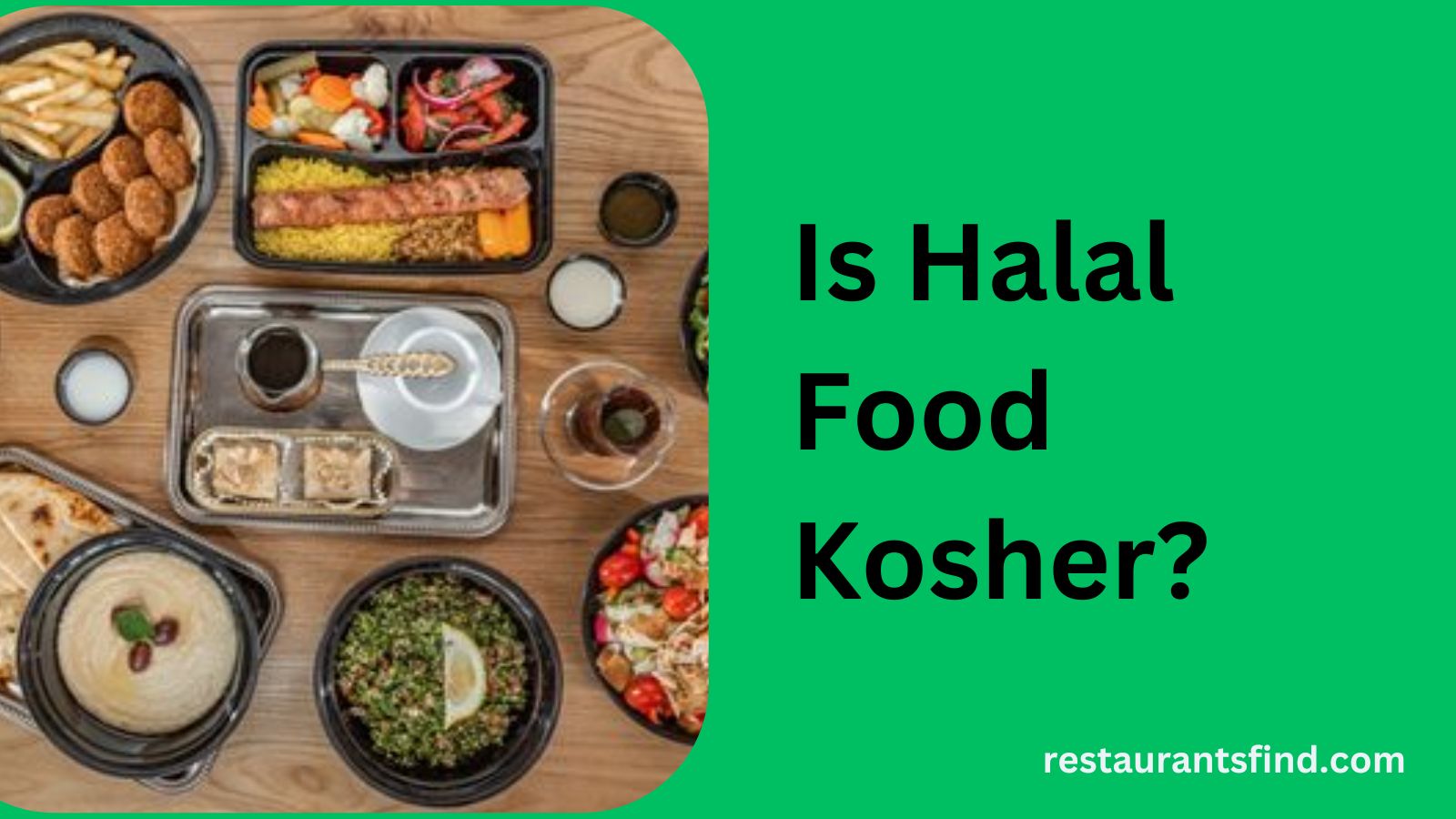When it comes to religious dietary laws, two of the most commonly discussed are halal and kosher. Both terms refer to foods that are permissible according to Islamic and Jewish laws, respectively. However, the question often arises: Is halal food kosher? To answer this, we must delve into the details of what each term entails, their differences, and where they overlap.

What is Halal?
Halal is an Arabic word meaning “permissible” or “lawful.” In the context of food, it refers to anything that adheres to Islamic dietary laws as outlined in the Quran. For meat to be considered halal, several specific criteria must be met:
- Slaughtering Method: The animal must be slaughtered by a Muslim who invokes the name of Allah (God) before making a swift cut to the throat, allowing the blood to drain from the body.
- Permissible Animals: Certain animals, like pigs, are entirely forbidden (haram) in Islam. Only animals that are deemed permissible, such as cattle, sheep, and poultry, can be consumed.
- Blood Drainage: The blood must be completely drained from the veins as it is considered impure.
- Preparation: The food must not come into contact with anything haram, like alcohol or pork products, during its preparation.
What is Kosher?
Kosher, derived from the Hebrew word “kashrut,” means “fit” or “proper.” It refers to foods that conform to Jewish dietary laws, as dictated by the Torah. Kosher rules are intricate and involve several key elements:
- Slaughtering Method: The animal must be slaughtered by a trained Jewish slaughterer (shochet) who uses a specific method known as Shechita. A blessing is also recited before the slaughter.
- Permissible Animals: Like halal, kosher law prohibits certain animals, including pigs. Additionally, kosher laws specify that only animals that chew their cud and have split hooves can be eaten, which excludes some animals allowed in halal.
- Blood Removal: After slaughter, the meat undergoes a process to remove all blood, either by soaking and salting or by broiling.
- Separation of Meat and Dairy: Kosher laws strictly prohibit the mixing of meat and dairy products, so they must be prepared and consumed separately.
- Inspection: Each animal is inspected for any signs of disease, as the presence of certain illnesses can render the animal non-kosher (treif).
Key Differences Between Halal and Kosher
While halal and kosher have similarities, they are governed by different religious principles, leading to distinct practices:
- Slaughtering Methods: Both halal and kosher require a specific slaughtering process, but the methods and religious rituals differ. In halal, the emphasis is on invoking Allah’s name and draining the blood, while kosher places equal importance on the method and an additional focus on the inspection of the animal.
- Animal Selection: Kosher laws are more restrictive in terms of the types of animals allowed. For example, halal permits the consumption of camel and rabbit, while kosher does not.
- Blood Consumption: Although both halal and kosher prohibit the consumption of blood, kosher practices involve an additional step of soaking and salting the meat to ensure all blood is removed.
- Processing and Handling: Kosher laws require strict separation of meat and dairy, which is not a requirement in halal.
Is Halal Food Kosher?
The short answer is no. While there are similarities in the principles and practices of halal and kosher, they are not interchangeable. Halal food does not automatically meet kosher standards due to differences in slaughtering methods, animal selection, and additional requirements like the separation of meat and dairy in kosher practices.
For instance, the kosher method of Shechita has its unique rules, including a trained shochet performing the slaughter and an in-depth inspection of the animal’s health, which are not required in halal practices. Moreover, kosher laws are more restrictive in terms of permissible animals and the processing of food, meaning that even if an item is halal, it might not fulfill kosher criteria.
However, there may be some instances where halal food meets the kosher requirements, but these are exceptions rather than the rule. It’s essential for those observing kosher dietary laws to seek proper certification rather than assuming halal is equivalent to kosher.
Can Halal Food Be Considered Kosher?
The short answer is no. While there are overlaps in the principles and practices of halal and kosher, they are not interchangeable. The differences in slaughtering methods, animal selection, and other religious requirements mean that halal food does not automatically meet kosher standards, and vice versa.
However, some Jewish individuals might accept halal meat in situations where kosher meat is unavailable, but this is not a universally accepted practice and depends on individual interpretation of Jewish law.
What is Kosher Wine? A Complete Guide to its Production and Significance
Overlaps Between Halal and Kosher
Despite the differences, halal and kosher share several similarities:
- Ethical Treatment: Both halal and kosher laws emphasize the ethical treatment of animals, insisting on humane slaughtering practices.
- Cleanliness: Both practices stress the importance of cleanliness and purity in food preparation.
- Shared Foods: Certain foods, such as fruits, vegetables, and grains, are generally considered both halal and kosher, as they don’t involve any animal products or prohibited substances.
Why the Confusion?
The confusion between halal and kosher often stems from their cultural and religious overlaps. Both practices have strict guidelines that followers adhere to, which can lead people to assume they are the same. Additionally, in multicultural societies, halal and kosher foods might be labeled or marketed similarly, contributing to the misunderstanding.
Conclusion
While halal and kosher share some commonalities, they are distinct dietary systems governed by different religious laws. Halal food is not considered kosher, and kosher food may not always meet halal standards. Understanding these differences is important for those adhering to these dietary laws and for anyone interested in the cultural and religious practices surrounding food.
What is Halal Certification in India?


2 thoughts on “Is Halal Food Kosher? Understanding the Differences and Overlaps”